

Anxiety Relief. Why is it so hard to stop worrying?
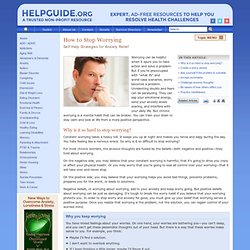
Constant worrying takes a heavy toll. It keeps you up at night and makes you tense and edgy during the day. You hate feeling like a nervous wreck. So why is it so difficult to stop worrying? For most chronic worriers, the anxious thoughts are fueled by the beliefs—both negative and positive—they hold about worrying. On the negative side, you may believe that your constant worrying is harmful, that it’s going to drive you crazy or affect your physical health. On the positive side, you may believe that your worrying helps you avoid bad things, prevents problems, prepares you for the worst, or leads to solutions. Negative beliefs, or worrying about worrying, add to your anxiety and keep worry going. Why you keep worrying You have mixed feelings about your worries.
Maybe I'll find a solution. You have a hard time giving up on your worries because, in a sense, your worries have been working for you. Worry and anxiety self-help tip #1: Create a worry period. Chronic Anxiety Disorder: The Price You Pay for Hiding Your True Self. The more I learn about anxiety, the more I realize just how widespread a problem it really is.
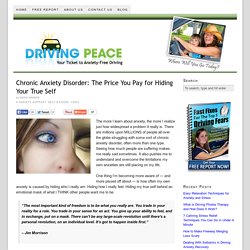
There are millions upon MILLIONS of people all over the globe struggling with some sort of chronic anxiety disorder, often more than one type. Seeing how much people are suffering makes me really sad sometimes. It also pushes me to understand and overcome the limitations my own anxieties are still placing on my life. One thing I’m becoming more aware of — and more pissed off about — is how often my own anxiety is caused by hiding who I really am. Hiding how I really feel. “The most important kind of freedom is to be what you really are. Anxious people tend to be intelligent, sensitive people. I’d hazard a guess there’s not one person with chronic anxiety disorder who hasn’t hidden their true self behind an emotional and/or behavioral mask at one time or another. There’s nothing wrong with hiding what we really think or feel in certain situations. The People Pleaser Mask.
Let It Be: Using Mindfulness to Overcome Anxiety and Depression. “Perhaps many things inside you have been transformed; perhaps somewhere, someplace deep inside your being, you have undergone important changes while you were sad.”
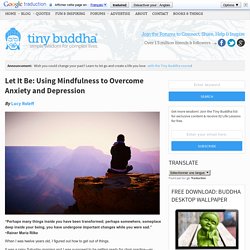
~Rainer Maria Rilke When I was twelve years old, I figured out how to get out of things. It was a rainy Saturday morning and I was supposed to be getting ready for choir practice—an eight-hour rehearsal before a big concert. Eight hours! I began to obsess about how much time this was in my then tiny life. As though by my own will, a heavy sensation of dread and nausea arose. Unfortunately for me, this would happen many more times, well into my adult life. Commitment equaling nausea coupled with a terrible fear of vomiting. It wasn’t until I was sixteen that it started affecting school. At twenty-four, a friend made a comment: “I don’t think those tablets are actually treating what you think they’re treating. I realized then that I had been swallowing them purely out of habit.
FINALLY. Someone Explained Anxiety Perfectly For Those Who Don't Understand It. Social Anxiety Disorder and Social Phobia: Symptoms, Self-Help, and Treatment. What is social anxiety disorder / social phobia?
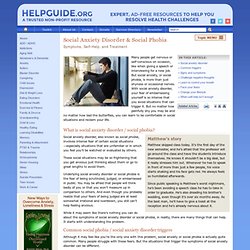
Matthew’s story Matthew skipped class today. It’s the first day of the new semester, and he’s afraid that the professor will go around the class and have the students introduce themselves. He knows it shouldn’t be a big deal, but it really stresses him out. Whenever he has to speak in front of more than just a few people, his voice starts shaking and his face gets red. Since public speaking is Matthew’s worst nightmare, he’s been avoiding a speech class he has to take in order to graduate. Social anxiety disorder, also known as social phobia, involves intense fear of certain social situations—especially situations that are unfamiliar or in which you feel you’ll be watched or evaluated by others.
These social situations may be so frightening that you get anxious just thinking about them or go to great lengths to avoid them. Anxiety Attacks and Anxiety Disorders: Signs, Symptoms, and Treatment. Understanding anxiety disorders Anxiety is the body’s natural response to danger, an automatic alarm that goes off when you feel threatened, under pressure, or are facing a stressful situation.
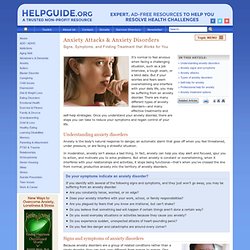
In moderation, anxiety isn’t always a bad thing. In fact, anxiety can help you stay alert and focused, spur you to action, and motivate you to solve problems. But when anxiety is constant or overwhelming, when it interferes with your relationships and activities, it stops being functional—that’s when you’ve crossed the line from normal, productive anxiety into the territory of anxiety disorders. Do your symptoms indicate an anxiety disorder? Anxiety Disorders are real, serious, and treatable.